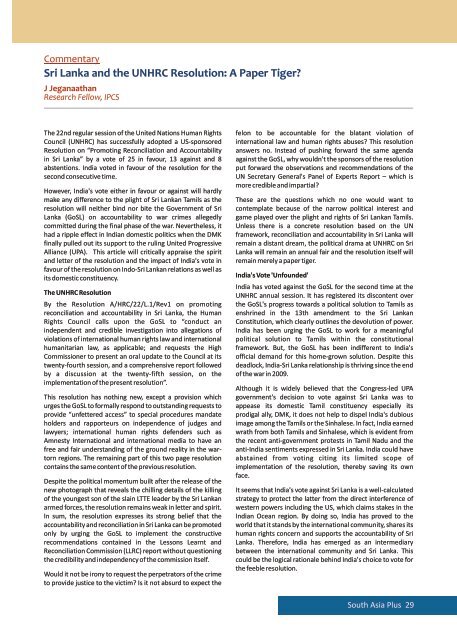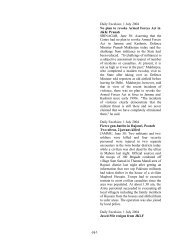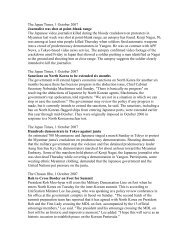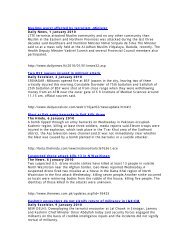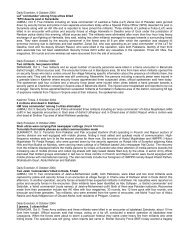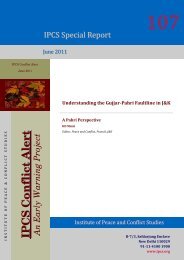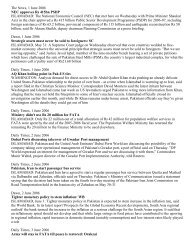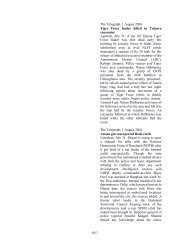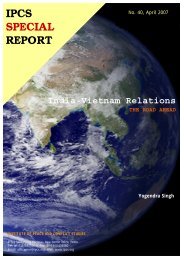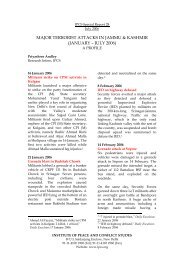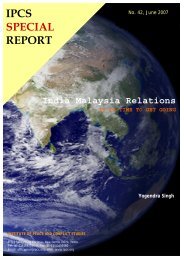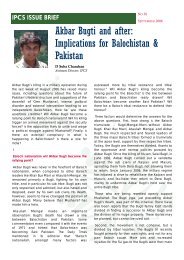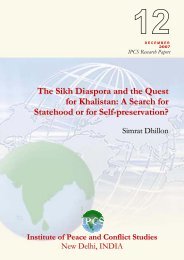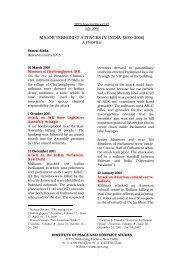April-June 2013 - Institute of Peace and Conflict Studies
April-June 2013 - Institute of Peace and Conflict Studies
April-June 2013 - Institute of Peace and Conflict Studies
Create successful ePaper yourself
Turn your PDF publications into a flip-book with our unique Google optimized e-Paper software.
Commentary<br />
Sri Lanka <strong>and</strong> the UNHRC Resolution: A Paper Tiger?<br />
J Jeganaathan<br />
Research Fellow, IPCS<br />
The 22nd regular session <strong>of</strong> the United Nations Human Rights<br />
Council (UNHRC) has successfully adopted a US-sponsored<br />
Resolution on “Promoting Reconciliation <strong>and</strong> Accountability<br />
in Sri Lanka” by a vote <strong>of</strong> 25 in favour, 13 against <strong>and</strong> 8<br />
abstentions. India voted in favour <strong>of</strong> the resolution for the<br />
second consecutive time.<br />
However, India's vote either in favour or against will hardly<br />
make any difference to the plight <strong>of</strong> Sri Lankan Tamils as the<br />
resolution will neither bind nor bite the Government <strong>of</strong> Sri<br />
Lanka (GoSL) on accountability to war crimes allegedly<br />
committed during the final phase <strong>of</strong> the war. Nevertheless, it<br />
had a ripple effect in Indian domestic politics when the DMK<br />
finally pulled out its support to the ruling United Progressive<br />
Alliance (UPA). This article will critically appraise the spirit<br />
<strong>and</strong> letter <strong>of</strong> the resolution <strong>and</strong> the impact <strong>of</strong> India's vote in<br />
favour <strong>of</strong> the resolution on Indo-Sri Lankan relations as well as<br />
its domestic constituency.<br />
The UNHRC Resolution<br />
By the Resolution A/HRC/22/L.1/Rev1 on promoting<br />
reconciliation <strong>and</strong> accountability in Sri Lanka, the Human<br />
Rights Council calls upon the GoSL to “conduct an<br />
independent <strong>and</strong> credible investigation into allegations <strong>of</strong><br />
violations <strong>of</strong> international human rights law <strong>and</strong> international<br />
humanitarian law, as applicable; <strong>and</strong> requests the High<br />
Commissioner to present an oral update to the Council at its<br />
twenty-fourth session, <strong>and</strong> a comprehensive report followed<br />
by a discussion at the twenty-fifth session, on the<br />
implementation <strong>of</strong> the present resolution”.<br />
This resolution has nothing new, except a provision which<br />
urges the GoSL to formally respond to outst<strong>and</strong>ing requests to<br />
provide “unfettered access” to special procedures m<strong>and</strong>ate<br />
holders <strong>and</strong> rapporteurs on independence <strong>of</strong> judges <strong>and</strong><br />
lawyers; international human rights defenders such as<br />
Amnesty International <strong>and</strong> international media to have an<br />
free <strong>and</strong> fair underst<strong>and</strong>ing <strong>of</strong> the ground reality in the wartorn<br />
regions. The remaining part <strong>of</strong> this two page resolution<br />
contains the same content <strong>of</strong> the previous resolution.<br />
Despite the political momentum built after the release <strong>of</strong> the<br />
new photograph that reveals the chilling details <strong>of</strong> the killing<br />
<strong>of</strong> the youngest son <strong>of</strong> the slain LTTE leader by the Sri Lankan<br />
armed forces, the resolution remains weak in letter <strong>and</strong> spirit.<br />
In sum, the resolution expresses its strong belief that the<br />
accountability <strong>and</strong> reconciliation in Sri Lanka can be promoted<br />
only by urging the GoSL to implement the constructive<br />
recommendations contained in the Lessons Learnt <strong>and</strong><br />
Reconciliation Commission (LLRC) report without questioning<br />
the credibility <strong>and</strong> independency <strong>of</strong> the commission itself.<br />
Would it not be irony to request the perpetrators <strong>of</strong> the crime<br />
to provide justice to the victim? Is it not absurd to expect the<br />
felon to be accountable for the blatant violation <strong>of</strong><br />
international law <strong>and</strong> human rights abuses? This resolution<br />
answers no. Instead <strong>of</strong> pushing forward the same agenda<br />
against the GoSL, why wouldn't the sponsors <strong>of</strong> the resolution<br />
put forward the observations <strong>and</strong> recommendations <strong>of</strong> the<br />
UN Secretary General's Panel <strong>of</strong> Experts Report – which is<br />
more credible <strong>and</strong> impartial?<br />
These are the questions which no one would want to<br />
contemplate because <strong>of</strong> the narrow political interest <strong>and</strong><br />
game played over the plight <strong>and</strong> rights <strong>of</strong> Sri Lankan Tamils.<br />
Unless there is a concrete resolution based on the UN<br />
framework, reconciliation <strong>and</strong> accountability in Sri Lanka will<br />
remain a distant dream, the political drama at UNHRC on Sri<br />
Lanka will remain an annual fair <strong>and</strong> the resolution itself will<br />
remain merely a paper tiger.<br />
India's Vote 'Unfounded'<br />
India has voted against the GoSL for the second time at the<br />
UNHRC annual session. It has registered its discontent over<br />
the GoSL's progress towards a political solution to Tamils as<br />
enshrined in the 13th amendment to the Sri Lankan<br />
Constitution, which clearly outlines the devolution <strong>of</strong> power.<br />
India has been urging the GoSL to work for a meaningful<br />
political solution to Tamils within the constitutional<br />
framework. But, the GoSL has been indifferent to India's<br />
<strong>of</strong>ficial dem<strong>and</strong> for this home-grown solution. Despite this<br />
deadlock, India-Sri Lanka relationship is thriving since the end<br />
<strong>of</strong> the war in 2009.<br />
Although it is widely believed that the Congress-led UPA<br />
government's decision to vote against Sri Lanka was to<br />
appease its domestic Tamil constituency especially its<br />
prodigal ally, DMK, it does not help to dispel India's dubious<br />
image among the Tamils or the Sinhalese. In fact, India earned<br />
wrath from both Tamils <strong>and</strong> Sinhalese, which is evident from<br />
the recent anti-government protests in Tamil Nadu <strong>and</strong> the<br />
anti-India sentiments expressed in Sri Lanka. India could have<br />
abstained from voting citing its limited scope <strong>of</strong><br />
implementation <strong>of</strong> the resolution, thereby saving its own<br />
face.<br />
It seems that India's vote against Sri Lanka is a well-calculated<br />
strategy to protect the latter from the direct interference <strong>of</strong><br />
western powers including the US, which claims stakes in the<br />
Indian Ocean region. By doing so, India has proved to the<br />
world that it st<strong>and</strong>s by the international community, shares its<br />
human rights concern <strong>and</strong> supports the accountability <strong>of</strong> Sri<br />
Lanka. Therefore, India has emerged as an intermediary<br />
between the international community <strong>and</strong> Sri Lanka. This<br />
could be the logical rationale behind India's choice to vote for<br />
the feeble resolution.<br />
South Asia Plus 29


